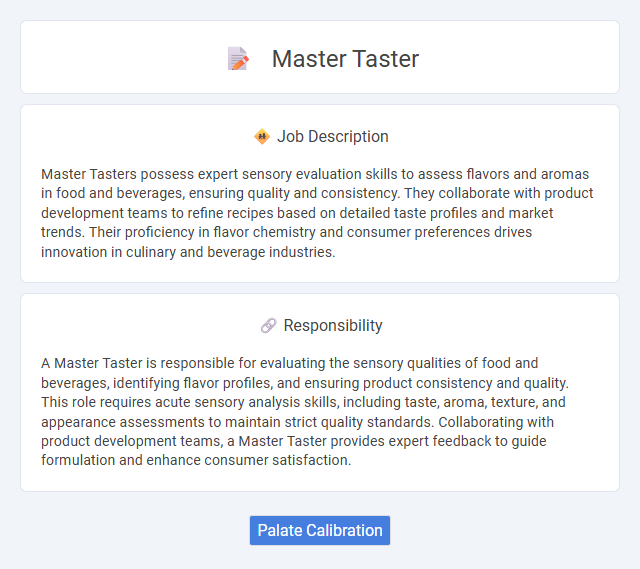
Master Tasters possess expert sensory evaluation skills to assess flavors and aromas in food and beverages, ensuring quality and consistency. They collaborate with product development teams to refine recipes based on detailed taste profiles and market trends. Their proficiency in flavor chemistry and consumer preferences drives innovation in culinary and beverage industries.
Individuals with a highly developed sense of taste and strong attention to detail are more likely to excel as a Master Taster. Those who are patient, possess good communication skills, and can work under pressure may find this role suitable, as it often involves analyzing flavors and providing precise feedback. Conversely, people with taste sensitivity issues or who struggle with consistent focus might face challenges in performing well in this profession.
Qualification
A Master Taster requires expert sensory evaluation skills, often demonstrated through certifications such as the Certified Master Taster program or equivalent sommelier qualifications. Extensive knowledge of flavor profiles, aroma compounds, and product origins is essential, usually supported by a background in food science, beverage studies, or gastronomy. Practical experience with sensory panels and rigorous training in taste discrimination and quality assessment is critical for ensuring precise and consistent product evaluations.
Responsibility
A Master Taster is responsible for evaluating the sensory qualities of food and beverages, identifying flavor profiles, and ensuring product consistency and quality. This role requires acute sensory analysis skills, including taste, aroma, texture, and appearance assessments to maintain strict quality standards. Collaborating with product development teams, a Master Taster provides expert feedback to guide formulation and enhance consumer satisfaction.
Benefit
Master Tasters likely experience enhanced sensory skills, leading to more precise product evaluations and improved quality control. They probably enjoy increased career opportunities and higher earning potential due to their specialized expertise. The role may also offer personal satisfaction from influencing product development and consumer satisfaction in the food and beverage industry.
Challenge
Master Taster roles likely demand a keen sensory perception and the ability to identify subtle flavor profiles, presenting ongoing challenges in maintaining consistency and accuracy. The probability of encountering complex product variations requires continuous calibration of taste and olfactory skills. Adapting to evolving industry standards could further test a Master Taster's expertise and adaptability.
Career Advancement
A Master Taster specializes in evaluating the flavor, aroma, and quality of food and beverages, playing a crucial role in product development and quality control. Career advancement opportunities include transitioning into roles such as Head of Sensory Evaluation, Product Development Manager, or Quality Assurance Director within food, beverage, and hospitality industries. Expertise in sensory science and certifications in tasting techniques accelerate progression towards leadership positions and consultancy roles.
Key Terms
Palate Calibration
Master Tasters possess expert palate calibration skills essential for identifying subtle flavor notes, aroma profiles, and texture variations in food and beverages. Their refined sensory evaluation abilities enable precise quality control and product consistency in industries such as wine, coffee, chocolate, and spirits. Accurate palate calibration ensures the detection of defects and the validation of desired taste characteristics, supporting superior product development and customer satisfaction.
 kuljobs.com
kuljobs.com